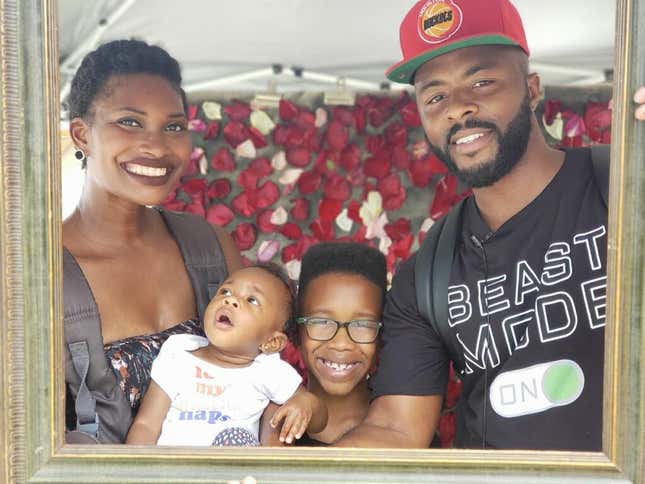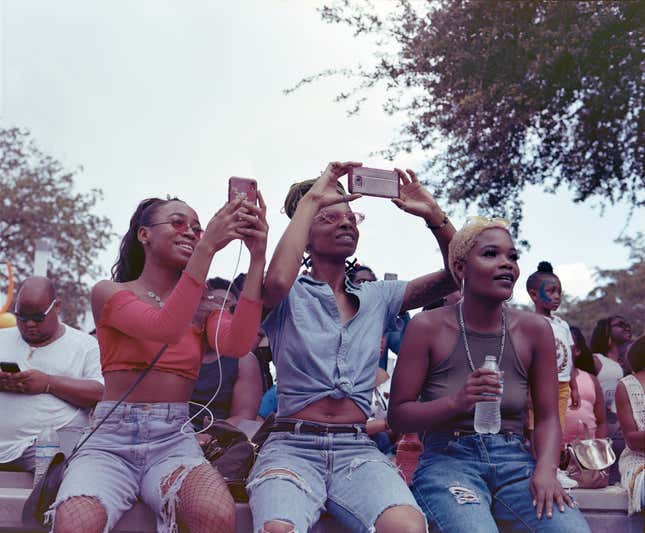
Every story of black struggle and black triumph is also a story of black love. Too often, we view love mainly through the lens of romance, as if those are the only love stories worth telling. But there are bigger, more expansive, more radical ways that we can contemplate black love—including self-love, familial and platonic love, and even communal love. And as we commemorate and celebrate Juneteenth, we should also begin to recognize its celebration as one of the most radical black love stories ever told.
Because the story of black love is a story of survival.
As a Texan, Juneteenth is a holiday I feel deeply connected to. It was in Galveston, Texas, about 45 minutes away from my hometown Houston, that Major General Gordon Granger declared that all those enslaved be unequivocally set free, some 2½ years after the Emancipation Proclamation. Despite the purposefully late news of freedom, and some slaveowners’ continued refusal to release those enslaved, some of the newly-freed black men, women and children migrated to Houston and settled into what would become known as Freedman’s Town, in the city’s Fourth Ward.
Building Freedman’s Town, with little, if any, help from the city of Houston was a labor of love, a bet on black futures and a commitment to self-love and self-determination. As this brand-new free town began to build and flourish, its residents collected funds to purchase land where they could celebrate Juneteenth, their answered prayers and their new beginnings every year.
This pooling of resources and love bought 10 acres of land in Houston’s Third Ward. The residents of Freedman’s Town, under the leadership of local church leaders and businessmen, aptly named the space Emancipation Park. Almost 150 years later, Emancipation Park is still making space for celebrations of black love, black freedom, and black joy.

Part of the park’s Juneteenth celebration this year involved collaborating with local art and activism organization Project Row Houses to bring the Black School’s Black Love Fest to Houston. Project Row Houses has been loving on Houston’s Third Ward community, and beyond, for 25 years. At a time when the city and those living outside of the community saw Third Ward as a place overrun with crime, drugs, and poverty, PRH’s founders saw a space to create a new, more loving, narrative about black life in Houston.
Creating new, more loving, narratives around black life is a major component of the Black School’s mission, too. Shani Peters and Joseph Cuillier, founders of the art, activism and education organization, created Black Love Fest three years ago in New York City, hoping to center black love as both a cultural paragon and a cultural phenomenon. Recognizing the correlation between Houston’s first public Juneteenth celebration in 1872 and the city’s current day celebrations of Juneteenth, they told me they wanted to bring the Black Love Fest to Houston as part of the city’s celebration—especially as Third Ward faces mass gentrification, which too often comes with the displacement and erasure of the people and culture that made the community a newly sought-after destination to begin with.
I chose the chronicling of black love stories as my life’s work because we must remember that as long as black people have struggled and continue to struggle towards freedom, love is (and has always been) present. For Black Love Fest HTX, I collaborated with friend and fellow artist Brian Ellison—who is a photographer and documentary filmmaker—to record the love stories of fest attendees.
We envision our collective work to be similar to radical-black-love workers and visionaries like Zora Neale Hurston, who traveled throughout the Deep South and through the Caribbean as an ethnographer recording stories of black life. We imagine the richness of the stories that could have been captured over the last almost 150 years that black Houstonians have celebrated Juneteenth, and we envision someone finding the archives of our photo and video recordings on black love 150 years into the future.
With that in mind, we didn’t just want to record surface conversations on how couples met—or even how and why they fell in love. Those stories are important, for sure, but we wanted to record deeper conversations—conversations that might serve as hopeful instructions on how to survive (through loving) in a world that seems intent on destroying us, our families, our communities and our futures.
Do black men feel it important to practice self-care as a component of survival? What ways can black women practice radical softness as self-love and self-care? How do black parents model love for their children, and how do black leaders believe we can become better lovers to our communities? What is the importance of platonic relationships, and what about the self-love and courage it takes for black queer folks to show up and demand space for their multiple identities? And how do the love stories of other black artists like us inform the art they create?
Brian created a beautiful backdrop filled with fresh red rose petals. We asked each participant to center themselves in a vintage gold frame. We wanted each of them to know that they (and their stories) are beautiful works of art. And the stories were indeed beautiful. We watched as one attendee, Ebony, fought back tears articulating her desire to be soft and vulnerable in a world that refuses to make space for that softness. Another mom, Tiondra, expressed a need to teach her daughter accountability as a self-love practice. My favorite story of the day came from the Renchers, a family of four. As father Nolan Sr. spoke of modeling love for his son, he also spoke about nurturing his sons’ talents. Nolan Jr., who is only eight years old, has already published his first book, which dad illustrated.
Our immediate goal is to edit our video and photograph footage into a short documentary film—a film that will remind the world that we are here, that we are loving, and that we have always loved. Our long-term goal is to continue to partner with organizations like Project Row Houses and The Black School to present black love as a black cultural artifact, disrupting the narrative that black people are not working to become better lovers—to ourselves, to one another and to our larger communities.
Visit the Black Love Fest HTX Instagram for more photos from Houston’s Black Love Fest, learn more about art as activism by connecting with The Black School and Project Row Houses, and follow The Love No Limit Show (where I’m creating expansive conversations about black love) and The Black Man Project (where Brian is creating space for conversations around healthy black manhood).

